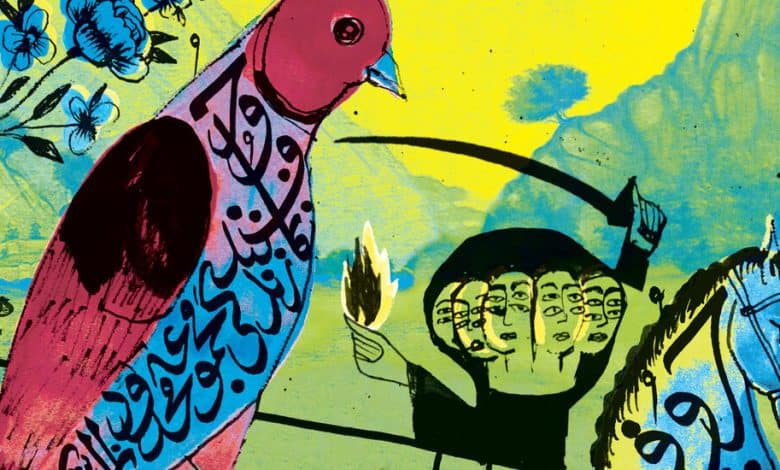A Death-Haunted First Novel Incandescent With Life

Martyr!, by Kaveh Akbar
Cyrus Shams, the aching protagonist at the heart of Kaveh Akbar’s incandescent first novel, is a veritable Rushdiean multitude: an Iranian-born American, a “bad” immigrant, a recovering addict, a straight-passing queer, an almost-30 poet who rarely writes, an orphan, a runner of open mics, an indefatigable logophile, a fiery wit, a self-pitying malcontent. But above all else Cyrus is sad; profoundly, inconsolably, suicidally sad.
His oceanic sorrows are fed by many Styxes, but the deepest and darkest is his mother Roya’s “unspeakable” death. Just a few months after Cyrus was born, Roya boarded a plane from Tehran to Dubai to visit her brother Arash, “who had been unwell since serving in the Iranian Army against Iraq.” Soon after her plane took off, it was blown up by a missile fired from a U.S. Navy warship: “Just shot out of the sky. Like a goose.”
The reference is to the notorious real-life destruction of Iran Air Flight 665 by the U.S.S. Vincennes in 1988. Sixty-six children were aboard Flight 665 — Cyrus should have been the 67th, but Roya decided to leave her son home because he was so young.
It is her tragic death that shatters the Shams family irrevocably, plunging Arash deeper into his unwellness — “He began seeing ghouls out the windows, demons, angels, Iraqi soldiers” — and driving Cyrus’s father, Ali, to immigrate with his son to the United States to start his life again. If you think the condition of a native is a nervous one, try the condition of the immigrant who settles in the country that vaporized his loved one. The other American dream.
A numbed Ali, turned granite with resignation, ends up at an industrial poultry farm in Fort Wayne (“a chicken hadn’t shot his wife out of the sky”) and lives only for his distraught son, who grows up racked by night terrors, by insomnia, by irrational fears of deportation and lethal root beer. Young Cyrus tries to hold it all together, first by chatting with famous people in his dreams (Kareem Abdul-Jabbar, Madonna, Batman) and later through art, intoxicants, recovery and friends. But none of these palliatives eases his survivor’s guilt or stills the “doom organ,” as he calls it, “throbbing all day every day” in his throat, the siren song of the suicidaire.

We are having trouble retrieving the article content.
Please enable JavaScript in your browser settings.
Thank you for your patience while we verify access. If you are in Reader mode please exit and log into your Times account, or subscribe for all of The Times.
Thank you for your patience while we verify access.
Already a subscriber? Log in.
Want all of The Times? Subscribe.